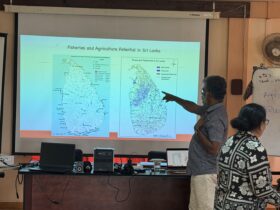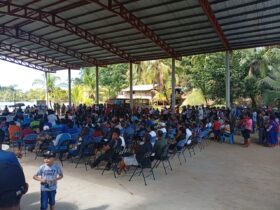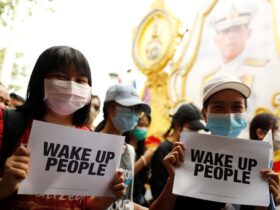Agenda made by: International Collective in Support of Fishworkers (ICSF)
Made at: Workshop on “Recasting the net: Defining a Gender Agenda for Sustaining Life and Livelihoods in Fishing Communities”. In Deco Hotels, Mahabalipuram, India, 7 – 10 July 2010.
A SHARED AGENDA
THE PROCESS
Thirty-nine participants from 18 countries, including women fishworkers, representatives of fishworker organizations and non-governmental organizations (NGOs), activists and researchers, met at Mahabalipuram, India, during 7-10 July 2010, to discuss the theme “Recasting the Net: Defining a Gender Agenda for Sustaining Life and Livelihoods in Fishing Communities”.
Informed by reports of national and regional workshops and consultations held in preparation for the workshop—from India, Thailand, the Philippines, South Africa, Brazil, Europe and Canada—and by experiences from Guinea Conakry, Chile and Tanzania, participants discussed and analyzed key issues facing women fishworkers and small-scale and artisanal fishing communities, as well as the strategies being adopted by them to assert their rights and defend their interests.
A presentation, based on a review of literature, analyzed the major shifts that have taken place over the last three decades in the dominant discourse on women in the small-scale fisheries. The first was a shift in focus from political economy to political ecology, which, while allowing a significant critique of the industrial model of development to emerge, obscured, over time, the analysis of women’s labour in the sector. The second was the shift from opposition to women’s oppression to an individual-centric gender- empowerment agenda, which dissociated gender from other structures of power. The third was the increasing emphasis on a human-rights framework, which obscured both community and women’s rights. Finally, there has been a growing dependence on donor aid for both social action and research. Given that destructive industrial fishing practices have been introduced in the South chiefly through aid tied to structural adjustment policies, and given further that donor aid is increasingly aligning itself with the imperatives of globalization, this dependence is problematic.
Participants at the workshop also discussed international legal instruments of relevance to women in fisheries, with a special focus on the Convention on the Elimination of All Forms of Discrimination against Women (CEDAW) and the Beijing Declaration and Platform of Action, and deplored their poor implementation. They heard presentations on the Programme on Fisheries and Aquaculture for Poverty Alleviation and Food Security of the Food and Agriculture Organization of the United Nations (FAO) and the proposal for an international instrument on small-scale fisheries that may be considered by the Committee on Fisheries (COFI) of the FAO.
Participants worked in groups to consolidate their “dreams” about fisheries that would sustain life and livelihoods in fishing communities, and to define an agenda for action to realize these dreams. They agreed on the analysis and shared agenda detailed below.
A SHARED AGENDA
FOR SUSTAINING LIFE AND LIVELIHOODS IN FISHING COMMUNITIES
Women are an integral part of small- scale and artisanal fisheries and fishing communities. Yet, their work and labour continue to remain invisible. Specific forms of discrimination cut across all aspects of women’s lives—their labour, sexuality and their fertility—undermining their dignity, sense of self- worth and self-confidence. It is women’s labour, unpaid or poorly paid, which sustains the existing model of development.
The existing model of development is also based on the unsustainable extraction of natural resources. This is leading to environmental degradation and the poisoning of waters and lands, eroding the very basis of the lives and livelihoods of inland and coastal fishing communities, including indigenous communities, while increasing women’s burden of unremunerated work. Fishing communities today increasingly face displacement from their lands and their fishing grounds due to, among other things, mega-projects related to oil and gas exploration, wind farms, tourism, commercial aquaculture and port development, which are being promoted by large corporations and some national governments. Displaced communities are forced to migrate in search of livelihood, facing heightened insecurity and vulnerability.
We are fully aware that if the logic of such development is not questioned and indiscriminate capital investment is not regulated, fishing communities and small- scale and artisanal fisheries will cease to exist. We are also fully aware of the need to defend the role and contribution of small-scale and artisanal fisheries to providing livelihood, employment and food security in a sustainable manner, into the future.
OUR DREAMS FOR THE FUTURE
We dream of a future in which:
• aquatic ecosystems are free of pollution, retaining their ability to regenerate living resources, sustain livelihoods and meet food security;
• interactions with natural resources are based on principles of sustainability and a respect for the rhythms and limits of nature;
• interactions within communities and with society are based on principles of equality, social justice and mutuality;
• there is respect for the diversity of ecosystems and communities and the recognition that this diversity is the basis for sustaining life and livelihoods;
• fishing communities, including women and children, are able to live their lives in peace and dignity, free of violence, and to enjoy decent living and working conditions;
• people have the right to work and to choose the work that they prefer, irrespective of the sexual division of labour, and all work, including reproductive work, is valued;
• the rights of fishing communities to their coastal lands, as well as the preferential access of small-scale and artisanal fishworkers and indigenous peoples to coastal and inland fisheries resources, are recognized;
• small-scale and artisanal fisheries are recognized for producing high-quality fish in a sustainable manner;
• fishing communities retain ownership and control over economic assets employed in fishing and fish processing and marketing operations;
• fishing communities have strong organizations, including producer organizations, enabling them to negotiate from positions of power, and in these organizations, women have central roles in decisionmaking;
• women engaged in fisheries activities have the first right to access the fish that is landed, and the marketing chain is restructured in equitable ways to privilege and valorize small-scale and artisanal fisheries and fishworkers;
• power to manage coastal and fishery resources is devolved to local and indigenous communities, and their capacity to do so is strengthened;
• planning for small-scale and artisanal fisheries takes into consideration broader aquatic and coastal management issues, and where traditional and local knowledge, together with scientific knowledge, form the basis of fisheries management systems;
• the choice of fisheries conservation and management mechanisms and instruments are sensitive to principles of equity, social justice and solidarity;
• fisheries conservation and management mechanisms and instruments promote community-based management and incorporate approaches other than market-driven quota management systems;
• fishing communities have access to the information they need to participate in decisionmaking in an informed way; and
• basic economic, social, cultural and political rights are guaranteed by the State through a range of instruments, including the provision of social security, education and health facilities and a range of social and infrastructure assets for fishing communities.
OUR AGENDA FOR ACTION
Based on these dreams, we propose the following action agenda for different sections of society:
Households and communities
• Strengthen the capacity of women to participate in fishworker movements and organizations.
• Challenge men’s resistance to women’s participation in organizations, where it exists, and ensure the sharing of household work.
• Enhance the capacity of communities, including through literacy programmes, information on aquatic ecology and access to appropriate technology.
• Secure an environment of safety and freedom from violence and sexual abuse within the household and community.
• Ensure that community-based organizations guarantee women’s participation in decision- making processes and their access to resources such as fish and fish products.
• Recognize and assert the value of traditional and local knowledge, including that of women, as an important component in decision- making processes.
Fishworker organizations
• Develop a culture in which all forms of discrimination are eliminated.
• Guarantee space and support for women to participate in decision- making processes, including those related to conservation and fisheries management.
• Address women’s issues within organizations, and create separate spaces for women to organize autonomously at local, regional, national and international levels.
• Promote exchanges between women fishworkers and their organizations across different contexts.
• Raise awareness about, and participate actively in monitoring implementation of, international instruments, such as CEDAW.
• Challenge liberalization of global trade and the decisions of the World Trade Organization on patenting of food products, in particular, fish and fish products.
• Promote equitable and sustainable alternatives to existing models of development.
Civil society organizations (including NGOs, media, consumers and environmental organizations)
• Promote awareness of the socioeconomic conditions and basic needs of fishing communities, especially of women and other marginalized groups.
• Respect and value traditional and local knowledge, and support efforts of fishing communities towards sustainable and equitable fisheries.
Research organizations
Taking cognizance of the shifts in the dominant discourse on women in fisheries, undertake research and analysis on:
• the conditions and contributions of women in small-scale and artisanal fisheries and fishing communities, and make the findings widely accessible;
• the impact of development and conservation projects on the lives of men, women and children in fishing communities; and
• the impact of fisheries conservation and management measures on the lives and livelihoods of fishing communities.
The State
• Guarantee access and control over resources by small-scale and artisanal fishers and their communities, with particular attention to women.
• Recognize and protect collective rights to the resources and territories on which fishing communities, including indigenous communities, have traditionally depended on for their food security and livelihoods.
• Guarantee universal health and social security and the socialization of housework, and protect existing systems of social security that have proven to be adequate.
• Guarantee safety, and assure freedom from violence and sexual abuse.
• Regulate markets, discouraging the concentration of capital, and promote local markets.
• Build the capacity of, and empower, fishing communities to manage their resources.
• Promote education and capacity-building of fishing communities based on local realities and a culture of non-discrimination.
• Ratify and fully implement human-rights instruments, in particular CEDAW and the Beijing Declaration and Platform of Action, by adopting specific measures to address discrimination against women, while creating spaces for civil society organizations, in particular for women fishworkers and their organizations, to participate in monitoring their implementation.
• Support and protect coastal and inland communities, with particular attention to women, in relation to natural disasters and pandemics such as HIV/AIDS.
• Protect coastal communities from displacement or forced migration.
• Guarantee that both men and women of fishing communities are consulted and enabled to participate in decisionmaking, including in relation to fisheries conservation and management.
• Recognize and value traditional and local knowledge as an integral part of information required for fisheries conservation and management.
• Promote sustainable fisheries, mitigate pollution and reduce the impact of extractive industries such as oil and natural gas.
• Recognize workers in the informal sector, in particular, women, including as collaborative spouses, and guarantee their labour rights and their rights to decent work.
• Generate sex-disaggregated data on those who work in all aspects of fisheries, through census operations.
International organizations
• Integrate an understanding of gender that shapes fisheries policies at various levels towards sustaining life and livelihoods in fishing communities.
• Desist from funding projects that are environmentally destructive and socially unjust, and that impose structural adjustment conditionalities (poverty reduction and growth facilities) on recipient States.
We resolve to work together to ensure that this agenda is widely disseminated, incorporated and implemented at all levels, including in an international instrument on small-scale fisheries that may be considered by the Committee on Fisheries (COFI) of the FAO.





Leave a Reply